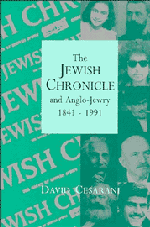Book contents
- Frontmatter
- Contents
- Preface
- Acknowledgements
- Introduction
- 1 Origins and pioneers, 1841–1855
- 2 Defining an identity: the Jewish Chronicle and mid-Victorian Anglo-Jewry, 1855–1878
- 3 The era of Asher Myers and Israel Davis, 1878–1906
- 4 The hegemony of Leopold Greenberg, 1907–1931
- 5 Discordant interlude: J. M. Rich and Mortimer Epstein, 1932–1936
- 6 Ivan Greenberg and the crisis years, 1937–1946
- 7 The post-war era: J. M. Shaftesley and David Kessler, 1946–1958
- 8 The Jewish Chronicle under William Frankel, 1958–1977
- 9 The Jewish press in a divided community: Geoffrey Paul, 1977–1990
- Conclusion
- Notes
- Bibliography
- Index
- Plate section
2 - Defining an identity: the Jewish Chronicle and mid-Victorian Anglo-Jewry, 1855–1878
Published online by Cambridge University Press: 22 September 2009
- Frontmatter
- Contents
- Preface
- Acknowledgements
- Introduction
- 1 Origins and pioneers, 1841–1855
- 2 Defining an identity: the Jewish Chronicle and mid-Victorian Anglo-Jewry, 1855–1878
- 3 The era of Asher Myers and Israel Davis, 1878–1906
- 4 The hegemony of Leopold Greenberg, 1907–1931
- 5 Discordant interlude: J. M. Rich and Mortimer Epstein, 1932–1936
- 6 Ivan Greenberg and the crisis years, 1937–1946
- 7 The post-war era: J. M. Shaftesley and David Kessler, 1946–1958
- 8 The Jewish Chronicle under William Frankel, 1958–1977
- 9 The Jewish press in a divided community: Geoffrey Paul, 1977–1990
- Conclusion
- Notes
- Bibliography
- Index
- Plate section
Summary
Abraham Benisch, 1855–1868
In January 1853 a new Jewish newspaper, the Hebrew Observer, appeared. It was founded by Abraham Pierpoint Shaw, about whom almost nothing is known. However, it was edited by Abraham Benisch, who had come to prominence as a co-editor of the Voice of Jacob. A year later Benisch bought the Hebrew Observer from its founding proprietor. As early as March 1853, Marcus Bresslau, who had deserted Joseph Mitchell and the Jewish Chronicle in the autumn of 1851, was a regular contributor. He and Benisch thereby became associates, but after Mitchell's demise Bresslau returned to the Jewish Chronicle and tried to run it on his own. The market could not sustain two Jewish newspapers, and early in 1855 Benisch initiated a merger of the two journals. The new series was called the Jewish Chronicle and Hebrew Observer, a title which was retained until 1868. Change did not stop there. Once Benisch was installed in the Jewish Chronicle office, it was not long before he ousted Bresslau. From February 1855, Benisch was the sole editor and proprietor of the older paper.
Abraham Benisch was born in Bohemia in 1811, studied surgery in Prague around 1836, and later attended Vienna University. While in Prague he became friendly with Moritz Steinschneider, the great bibliographer of Hebraica, and helped to found a Jewish students' association devoted to the idea of restoring Jewish Palestine.
- Type
- Chapter
- Information
- The Jewish Chronicle and Anglo-Jewry, 1841–1991 , pp. 32 - 66Publisher: Cambridge University PressPrint publication year: 1994



